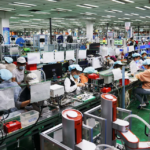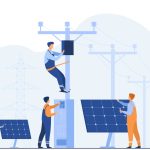When was the last time you checked your irrigation system? If you’re like most homeowners, it might not be something you think about often. Yet, a properly functioning irrigation system is key to keeping your lawn and garden looking their best. Unfortunately, when something goes wrong, the signs can be subtle – and if left unchecked, they can lead to serious damage or hefty water bills. So, how can you tell if your irrigation system needs repair, and what can be done to fix it?
Let’s go over some common signs that signal it’s time to call in a professional for irrigation repairs.
1. Uneven Water Distribution
One of the most noticeable signs that your irrigation system is struggling is uneven water distribution. Have you noticed dry patches of grass mixed with overly soggy areas? This is a classic sign that your sprinklers are not distributing water evenly.
Often, uneven watering is caused by:
- Clogged sprinkler heads – Debris like dirt, grass, or mineral deposits can block sprinkler heads, causing uneven spraying.
- Misaligned sprinkler heads – Over time, sprinkler heads can shift or become misaligned, spraying water in the wrong direction or missing sections altogether.
- Broken or cracked pipes – A broken pipe can reduce water pressure, leading to uneven distribution.
To fix uneven water distribution, it’s best to do a search for irrigation system repair near me and hire a professional who can inspect the entire system. They’ll check for any clogs, repair or replace broken heads, and ensure the system is aligned correctly. Don’t try to fix pipes yourself – it’s easy to miss small leaks or worsen the damage without the right tools.
2. Water Pooling in Certain Areas
Pooling water is a clear red flag. If you’re seeing puddles in certain areas of your yard after running the irrigation system, something isn’t right. This issue could be caused by a few different problems.
Possible causes include:
- Leaking pipes – Cracks or holes in pipes can lead to water collecting in one area.
- Low drainage – If your yard isn’t draining properly, water may be collecting after irrigation.
- Broken valves – Faulty valves may fail to stop water flow, causing excess water to pool in certain spots.
Fixing pooling water involves a thorough inspection. A pro will need to identify if the problem lies within the pipes, valves, or drainage system. They’ll have the expertise to repair or replace parts without causing further damage to your yard.
3. A Spike in Your Water Bill
Have you noticed an unexplained increase in your water bill? Your irrigation system may be the culprit. If the system is leaking or malfunctioning, it could be wasting water every time it runs, leading to higher bills.
Here are some possible reasons:
- Hidden leaks – You might not see water pooling above ground, but a hidden underground leak can waste gallons of water.
- System running too long – Sometimes, the timer or controller may malfunction, causing the system to run longer than it should.
- Malfunctioning sensors – If your system has rain or soil moisture sensors, they might not be working properly, leading to overwatering.
If your water bill has spiked, it’s time to call in a professional to check for hidden leaks or issues with your system’s controls. Fixing these issues quickly can save you money in the long run.
4. Sprinkler Heads Not Popping Up
Your sprinkler heads are designed to pop up when the system turns on, then retract when it’s off. If they’re failing to rise properly or staying stuck in the ground, something is definitely off.
Common causes for this include:
- Low water pressure – If there’s a drop in water pressure, the sprinkler heads might not have enough force to pop up.
- Damaged sprinkler heads – Over time, sprinkler heads can wear out, crack, or break, preventing them from functioning properly.
- Obstructions – Grass, soil, or other debris can block the sprinkler heads from rising.
To resolve this, a professional can inspect the system for obstructions or damage and repair or replace any faulty sprinkler heads. Additionally, they’ll test the water pressure to ensure everything is working smoothly.
5. System Won’t Turn On or Off
A more obvious sign of trouble is when your irrigation system either refuses to turn on or won’t shut off. This could point to an issue with the control system or electrical components.
Possible causes might include:
- Faulty wiring – Wiring problems can prevent the system from receiving signals to turn on or off.
- Broken timer – A malfunctioning timer can disrupt your irrigation schedule.
- Valve issues – A broken valve can lead to water continuing to flow even after the system is turned off.
In this case, it’s best to bring in an irrigation specialist to troubleshoot the electrical system or replace damaged components. Attempting to fix electrical issues yourself can be risky and may lead to further complications.
6. Low Water Pressure
If your irrigation system is delivering low water pressure, your lawn may not be receiving enough water, resulting in dry spots and poor plant health.
Reasons for low water pressure might include:
- Leaking pipes or fittings – Even a small leak can reduce the system’s overall pressure.
- Clogged pipes – Mineral buildup or debris in pipes can restrict water flow.
- Issues with the water source – There could be a problem with the water supply, such as a malfunctioning pump or valve.
Hiring a professional to diagnose low water pressure is key. They can clean or replace any clogged or damaged pipes and ensure your system is getting the right amount of water to keep your landscape healthy.
Time to Call in the Experts
Your irrigation system is essential for maintaining your landscape’s beauty and health. But like any system, it requires maintenance and occasional repairs. When you notice these common signs, it’s a good idea to bring in a professional for an inspection and repairs. They’ll have the expertise and tools to diagnose the problem and get your irrigation system back in top shape, saving you time, water, and money in the long run.













